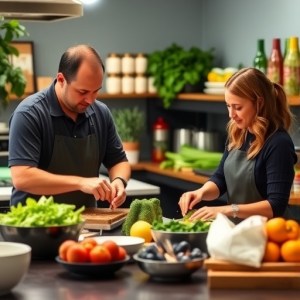The American College of Lifestyle Medicine (ACLM) has launched an exciting new program called the Culinary Medicine Program (CMP). This open-source initiative brings together culinary skills and nutrition education for healthcare professionals. The goal? To tackle the gap in nutrition training that many doctors and medical staff face.
The CMP offers around 15 hours of easy-to-follow video lessons. These cover everything from basic cooking skills to creating healthy, plant-based meals. It’s a resource that can be used independently by anyone looking to improve their diet or as part of a medical training curriculum.
Dr. Michelle Hauser, a Clinical Associate Professor at Stanford University and an expert in obesity medicine, leads this innovative program. She merges her medical and culinary training to turn complex nutrition advice into simple cooking actions. “Culinary medicine combines the joy of food with solid science,” she says. This approach aims to help both healthcare providers and patients make better dietary choices.
The CMP contains 115 individual lessons that make healthy cooking approachable. It also includes the second edition of the Culinary Medicine Curriculum (CMC), complete with guides, recipes, and shopping lists. This curriculum is designed to help medical schools and community kitchens integrate culinary medicine into their training.
Health education is evolving. Recently, the U.S. Department of Health and Human Services required medical schools to define specific nutrition education goals. The CMP meets these new standards by offering tools that address gaps in nutrition knowledge.
Moreover, Dr. Hauser believes that practical cooking skills are essential for effective health advice. By teaching healthcare providers how to cook, they can inspire patients to turn theoretical nutrition ideas into real-life habits. This hands-on learning style helps create lasting behavior changes.
Since its release, the CMP has made a significant impact, being used in over 100 countries and downloaded more than 13,000 times. This shows a growing global interest in culinary medicine. Its open-source nature allows for continuous updates, creating a community focused on improving nutrition education worldwide.
The CMP also utilizes technology for remote learning. Video demonstrations help users grasp cooking techniques that can be hard to learn through textbooks alone. This aligns with modern educational methods, making the material easier to remember and apply.
Supporters of the program, like Jeanne Rosner, MD, and organizations like Soul Food Salon, emphasize the importance of cultural relevance in nutrition. By incorporating various culinary traditions, the CMP makes nutrition education more inclusive and applicable to diverse groups.
In summary, the ACLM’s CMP and accompanying curriculum are transforming how medical nutrition is taught. By blending nutrition science with cooking skills, they empower both healthcare providers and individuals to adopt healthier eating practices. This initiative could lead to significant improvements in public health and patient outcomes.
Discover more about culinary medicine and nutrition education through the American College of Lifestyle Medicine at their official website: [ACLM Culinary Medicine Education](https://connect.lifestylemedicine.org/culinarymedicineeducation/home).


